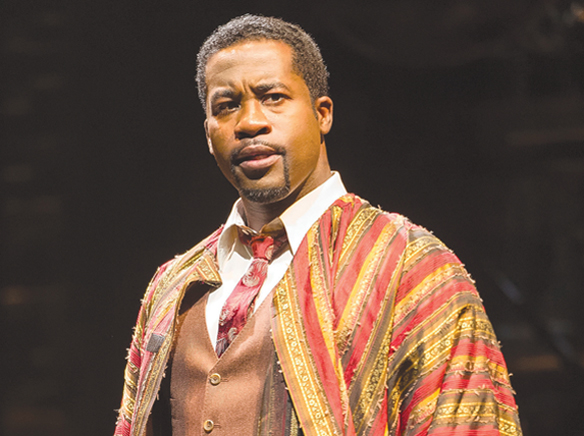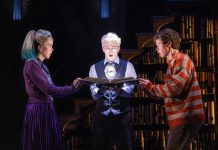Aspiring actors should make it a point to see "The Tallest Tree in the Forest" at the Mark Taper Forum because there is so much to learn, not only about Paul Robeson but about the craft of acting as well.
The one man show, written and performed by Daniel Beaty, is amazing because the actor not only portrays Robeson, but approximately 40 other additional characters who figured prominently in Robeson's very full life.
Aspiring actors should make it a point to see "The Tallest Tree in the Forest" at the Mark Taper Forum because there is so much to learn, not only about Paul Robeson but about the craft of acting as well.
The one man show, written and performed by Daniel Beaty, is amazing because the actor not only portrays Robeson, but approximately 40 other additional characters who figured prominently in Robeson's very full life.
Beaty begins in a child-like voice playing Paul as a young boy. He then morphs into his older brother and minister father. Later he gives voice to Robeson's wife Essie, a medical doctor and Robeson's manager.
Before the show is over Beaty has given life to an assorted cast of characters that seamlessly interacts with the gifted Paul Robeson who, in his prime, was the most famous black man in the world.
Born in New Jersey in 1898, Robeson was the son of a former slave. His father, a studious man, encouraged his younger child to study hard and to achieve. And achieve he did. Robeson won an academic scholarship to Rutgers University, was named twice to the All-American Football Team, was elected to Phi Beta Kappa and the Cap and Skull Honor Society and graduated valedictorian of his class in 1919. He then put himself through Columbia University Law School by playing on two NFL football teams.
When white people refused to be represented by a black man he quit the legal profession and turned to a career in the theatre. Not only could he act, he also had an amazing singing voice honed in his father's church choir. With his wife's help he found work on stage and screen.
Eugene O'Neill asked him to star in his plays "The Emperor Jones" and "All God's Chillun Got Wings," and he was the first black actor to play Othello on Broadway, but Robeson is probably most remembered for his powerful rendition of "Ol' Man River" in "Show Boat" on Broadway and in the film version starring Irene Dunne.
Beaty wrote his one man-show to honor Paul Robeson for his many talents and for his political activism on behalf of the under-represented and the poor. It was that activism that eventually led to his problems with the U.S. State Department. He was considered a Communist sympathizer, a charge he fought against vehemently.
Beaty's masterful performance, directed by Moises Kaufman, is punctuated throughout with countless songs that include "Ol' Man River," "The Joint Is Jumpin,'" "Go Down Moses," "Joshua Fit the Battle of Jericho" and "Great Day." Musical accompaniment is provided by Kenny J. Seymour on piano, Glen Berger on woodwinds and Ginger Murphy on the cello.
*
"The Tallest Tree in the Forest," at the Mark Taper Forum, 135 N. Grand Ave., downtown L.A., runs through May 25. For tickets and information call (213) 628-2772or online at HYPERLINK "http://www.centertheatregroup.org/"www.centertheatregroup.org.
**
'Philomena'—A True Story About Love, Loss and Forgiveness
By Theda Kleinhans Reichman
"Philomena," one of nine motion pictures nominated in the Best Film category, is the true story of Philomena Lee's search for her son. The screenplay, based on Martin Sixsmith's book "The Lost Child of Philomena Lee," published in 2009, was written by Steven Coogan and Jeff Pope. Coogan also co-produced the movie and starred as the journalist Martin Sixsmith.
Judy Dench, nominated for her heartfelt, touching performance, is brilliant in the title role. She can make you smile when she talks about the romantic novels she likes to read or gently tug at your heartstrings when she reveals the secret she has kept for fifty years.
In the film, as in real life, Martin first hears about Philomena's story from her daughter Jane at a party. When she learns he is a journalist, formerly with the BBC, she asks if he could help her mother find the son she was forced to give up for adoption 50 years earlier.
Martin declines, telling her that human interest stories don't interest him, but after talking with his wife, the cynical writer reconsiders his position and decides to meet with Philomena.
It is hard to believe that in the not so distant past being an unwed mother, particularly in Ireland, could cause so much pain and humiliation. In Philomena's case she was a naive girl who fell in love with a young man she met at a county fair. She knew nothing about love-making and sex. As a result she became pregnant at 18. Her horrified parents sent her away to Sean Ross Abbey in Roscrea, Ireland where, in 1952, she gave birth to an adorable baby boy she named Anthony. The head nun, Sister Hildegaard (Barbara Jefford) was a stern, unforgiving taskmaster who viewed the unfortunate young girls in her care as sinners.
But Philomena recalls another young nun at the abbey who secretly took a photo of her little boy. It is a photo she has treasured for a half century. To atone for her sin and to pay back the convent for her care she worked seven days a week in the laundry, only seeing her little boy one hour a week.
The gentle, heart-felt story could have turned into sentimental mush in the wrong hands, but Stephen Frears direction and Coogan's screenplay, laced with comedic moments and banter between the jaded Martin and the forgiving Philomena, keep the story warm, interesting and bittersweet.
And while what happened sheds a dark light on the church and the nuns at the abbey, Philomena is able to retain her faith and a strong belief in God and his goodness. This is hard for Martin, a lapsed Catholic, to understand.
Coogan's screenplay remains true to Philomena's quest to be reunited with her son, but he does take some liberties for dramatic and comedic effect. For example, in real life Martin comes to America on his own, while in the film Philomena joins him and is part of the fact-finding mission. This device allows us to enjoy their conversations as they make key discoveries together which reveal a lot about faith and the curative power of forgiveness.
In the book, on which the screenplay is based, Martin delves more into her son's story and his life in the United States. In the film version Coogan focuses on the facts from Philomena's point of view and pain. And in the end the facts revealed are the same, but are more entertaining with Philomena along for the ride.
Coogan's plot device keeps the story more involving and adds humor and warmth to one woman's quest to find her first born child, a quest that lasted for fifty years before the full truth was discovered. Philomena is happy with Coogan's film account since it reveals more about her heartbreak while the book delved more deeply into her son's identity and life in America. To say more would spoil the discoveries revealed in this very special film. "Philomena," rated PG-13, is now available on DVD.
Coogan, an English comedian, is also a fine actor and writer. And if his face looks familiar, but you aren't sure why, he was the mad-cap director in "Tropic Thunder" starring Ben Stiller and Robert Downey, Jr. and was the miniature Octavius in "Night at the Museum" also starring Ben Stiller.
As for the real Philomena, you saw her in the Oscar audience, even though Judi Dench was unable to be there for the ceremonies. Now 80 years old, she worked for 30 years as a psychiatric nurse and has two additional children, a son and a daughter, Jane, four grandchildren and two great-grandchildren. And she, like the onscreen Philomena, has made peace with the church and recently had an audience with Pope Francis.



















